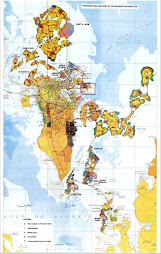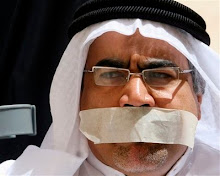Bahrain
Events of 2007
Human rights conditions in Bahrain worsened in 2007. Although the king, Shaikh Hamad bin `Isa al-Khalifa, undertook important reforms in 2001-2002, the government still has done little to institutionalize human rights protections in law. The government continued to subject freedom of expression, assembly, and association to arbitrary restrictions. Bahrain’s counterterrorism law as well as a new Drugs and Psychotropic Substances Law, enacted in August 2007, prescribe the death penalty for certain offences. In December 2006, the government executed a Bangladeshi man and woman and a Pakistani man convicted in separate murder cases. Except for a single execution in 1996, a time of great political turmoil, Bahrain had not executed anyone since 1977.
Bahrain held National Assembly and municipal elections in November and December 2006. Opposition political societies that boycotted the first elections, in 2002, participated in 2006, but some groups continue to boycott the Assembly, protesting what they regarded as the absence of real legislative authority for the elected representatives.
Freedom of Expression
Authorities continue to use the press law (Law 47/2002) to restrict coverage of controversial matters, particularly issues such as official corruption. In the first nine months of 2007, authorities referred the cases of 15 journalists to the public prosecutor, in most instances for alleged defamation of a government official or department. In May 2007, the government-appointed Shura Council, the upper chamber of the parliament, approved draft legislation that would remove criminal penalties for journalistic offenses, but as of November the government had not forwarded the draft to the elected National Assembly for approval.
In mid-November 2006 authorities arrested a 35-year-old dentist and a 32-year-old insurance salesman for attempting to distribute leaflets calling on Bahrainis to boycott the upcoming parliamentary elections. On January 30 a court sentenced them to prison terms of six months and one year, respectively, for dissemination and possession of materials that could “damage the public interest.” The government released them several weeks later, apparently following a pardon from the king.
In early February authorities arrested `Abd al-Hadi Khawaja, president of the Bahrain Center for Human Rights (BCHR), and Hassan Mushaima, head of Al Haq, a political opposition group, on charges of circulating false information, insulting the king, and inciting hatred against the government. In May, following demonstrations protesting their prosecution, the king declared the court proceedings against them “frozen.”
The country’s sole residential internet service provider, Batelco, is government-owned; the BCHR said in November that the authorities were blocking 23 discussion forums and other websites, including its own.
Freedom of Assembly
Law 32 of 2006 requires the organizers of any public meeting to notify the head of Public Security at least three days in advance and authorizes that official to determine whether a meeting warrants police presence on the basis of “its subject … or any other circumstance.” The law stipulates that meeting organizers are responsible for “forbidding any speech or discussion infringing on public order or morals,” but leaves “public order or morals” undefined.
During 2007 Bahraini authorities, citing Law 32/2006, banned meetings and on several occasions forcibly prevented or dispersed unauthorized gatherings. In several instances the police used what appeared to be excessive force and inflicted severe beatings on persons they seized, sometimes amounting to torture. On May 20 police reportedly fired rubber bullets at a gathering at which opposition political figures, including members of parliament, were speaking, injuring Ibrahim Sharif, a leader of the opposition National Democratic Action Society. The next evening, when riot police confronted a street demonstration protesting the May 20 incident, security forces seized and beat 22-year-old Ali Sa`id al-Khabaz and 46-year-old Hamid Yusif Ahmad, inflicting serious injuries on both men.
Freedom of Association
The government continues to deny legal status to the BCHR, which it ordered dissolved in 2004 after the BCHR’s president publicly criticized the prime minister. Several other groups, including the National Committee for the Unemployed and the Bahrain Youth Human Rights Society, attempted in 2005 to register with the Ministry of Social Development, as required by law, but at this writing had received no response to their application.
In 2007 the Ministry of Social Development drafted new legislation on civil society organizations, but at this writing the ministry had not submitted the draft to the Shura Council or the Chamber of Deputies. The draft law contains some improvements over the existing Law 21/1989, but includes numerous provisions incompatible with international standards and best practices regarding freedom of association. For example, the draft law maintains the authority of the minister of social development to close any organization for up to 60 days without having to provide any justification or court order, and includes criminal penalties for “any” violation of the law.
Bahrain has ratified some conventions of the International Labor Organization, but neither of the two core conventions governing freedom of association. Law 33/2002 permits workers to form and join unions, but the General Federation of Bahrain Trade Unions (GFBTU) filed a complaint with the ILO in June 2005 protesting what it said was the government’s repeated refusal to register six trade unions in the public sector. In 2007 the GFBTU filed another complaint protesting a November 2006 edict by the prime minister prohibiting strikes in numerous sectors of the economy.
Counterterrorism Measures
In August 2006 the king signed into law the “Protecting Society from Terrorist Acts” bill, despite concerns expressed by the UN special rapporteur on human rights and counterterrorism that it contained excessively broad definitions of terrorism and terrorist acts. Article 1 prohibits any act that would “damage national unity” or “obstruct public authorities from performing their duties.” Article 6 prescribes the death penalty for acts that “disrupt the provisions of the Constitution or laws, or prevent state enterprises or public authorities from exercising their duties.” The law also allows for extended periods of detention without charge or judicial review. The first trial of suspects, four Bahrainis and a Qatari, charged under the new law with funding and preparing terrorist attacks abroad, was scheduled to begin in late November 2007.
Women’s Rights
Bahrain has no written personal status law. Instead, separate Sharia-based family courts for Sunni and Shia Muslims hear marriage, divorce, custody, and inheritance cases. Family court judges, who are generally conservative religious scholars with limited formal legal training, render judgments according to their individual reading of Islamic jurisprudence. They have consistently favored men in their rulings and are unapologetically adverse to women’s equality. In June, a Sharia court denied the former wife of a Bahraini policeman custody of their three children and any rights to the marital home. Prior to the ruling, the 29-year-old woman appeared on television criticizing these judges for their handling of the case and the Ministry of Interior for failing to take any action against her ex-husband despite numerous allegations of physical abuse and harassment. The government has intensified its harassment of women’s rights activist Ghada Jamsheer following an April letter she addressed to Shaikh Hamad calling for the dissolution of the Supreme Council for Women (chaired by the king’s wife) for failing to do more to advance women’s status in the kingdom. Women’s rights organizations continued to call for a written unified personal status law.
Human Rights Defenders
As already noted, the Bahrain Center for Human Rights (BCHR) was ordered dissolved in 2004 and remains closed. Authorities arrested BCHR president `Abd al-Hadi Khawaja in early February 2007 on charges that included circulating false information, but in May the king “froze” judicial proceedings against him. In March the public prosecutor summoned BCHR Vice President Nabeel Rajab for questioning on the violation of a gag order prohibiting public discussion of alleged government efforts to manipulate National Assembly elections November 2006. The Bahrain Human Rights Society (BHRS), another independent rights organization, visited Jaw prison, a major detention facility, in December 2005, but despite requests, the government did not grant further access to detention centers in 2007.
Decree 56/2002, which confers immunity from investigation or prosecution on government officials alleged to be responsible for torture and other serious human rights abuses committed prior to 2001, remains on the books. The BCHR and BHRS together led a coalition of rights groups and opposition political societies in sponsoring workshops in June and September 2007 on setting up a truth and reconciliation mechanism to address such violations. The government continues to insist that it considers such matters closed. In its November 2006 response to the review conducted by the UN Committee Against Torture, the government said that the king’s reform project had “paved the way for the provision of humanitarian assistance and the realization of transitional justice, beginning with a general amnesty … closing a chapter on the past.” The authorities, however, did not prevent the transitional justice meetings from taking place and the minister of social development addressed the opening session of the June conference.
Key International Actors
Bahrain hosts the headquarters of the US Navy’s Fifth Fleet as well as “important air assets.” The US State Department’s Fiscal Year 2007 budget justification submitted to Congress identified access to Bahrain-based military facilities and airspace as “critical” to US military operations in Iraq, Afghanistan, and the Horn of Africa as well as “any contingency operations and/or force projections in the Gulf and Southwest Asian areas.” In June 2007 the UN Human Rights Council initiated its Universal Periodic Review (UPR) process, in which the council will review the human rights record of every country once every four years. The United Nations announced in September that Bahrain would be among the first 16 countries reviewed at the first UPR session in February 2008.
--------------------------------------------
http://hrw.org/englishwr2k8/docs/2008/01/31/bahrai17594.htm
skip to main |
skip to sidebar

خارطة البحرين الجديدة
Facebook Badge
Followers
فسيلة السنكيس
متى ما ظهرت الفسيلة - الصغير من النخل- من فوق سطح الأرض، فمن حقها أن تنمو وان تعانق السماء دون حصار أو مضايقة أو استهداف
حق الفسيلة في الحياة كحق غيرها، من المخلوقات، خاصة وإن كانت دليل أصالة شعب كشعب البحرين
--------------------------------------------------------------
صاحب المدونة: د.عبدالجليل السنكيس
ناشط، كاتب وباحث أكاديمي من البحرين
البريد الإلكتروني: asingace@gmail.com
مدونة اخرى: http://alsingace.katib.org/
هاتف:8179-3966-973+
حق الفسيلة في الحياة كحق غيرها، من المخلوقات، خاصة وإن كانت دليل أصالة شعب كشعب البحرين
--------------------------------------------------------------
صاحب المدونة: د.عبدالجليل السنكيس
ناشط، كاتب وباحث أكاديمي من البحرين
البريد الإلكتروني: asingace@gmail.com
مدونة اخرى: http://alsingace.katib.org/
هاتف:8179-3966-973+
مواقع ووصلات ذات صلة Links of Interest
صور معبرة

خارطة البحرين الجديدة






